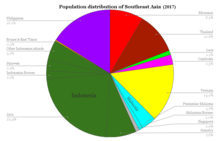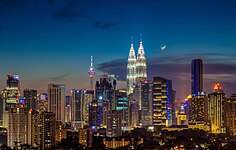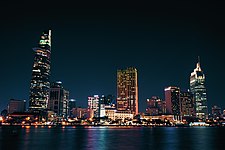Demographics

Southeast Asia has an area of approximately 4,500,000 square kilometres (1,700,000 sq mi). As of 2018, around 655 million people live in the region, more than a fifth live (143 million) on the Indonesian island of Java, the most densely populated large island in the world. Indonesia is the most populous country with 268 million people, and also the 4th most populous country in the world. The distribution of the religions and people is diverse in Southeast Asia and varies by country. Some 30 million overseas Chinese also live in Southeast Asia, most prominently in Christmas Island, Indonesia, Malaysia, the Philippines, Singapore, and Thailand, and also as the Hoa in Vietnam. People of Southeast Asian origins are known as Southeast Asians or Aseanites.
Largest cities in Southeast Asia
PSA Census August 2015 | |||||||||
|---|---|---|---|---|---|---|---|---|---|
| Rank | Name | Country | Pop. | Rank | Name | Country | Pop. | ||
 Jakarta  Bangkok |
1 | Jakarta | Indonesia | 10,135,030 | 11 | Medan | Indonesia | 2,185,789 |  Ho Chi Minh City  Hanoi |
| 2 | Bangkok | Thailand | 8,305,218 | 12 | Tangerang | Indonesia | 2,001,925 | ||
| 3 | Ho Chi Minh City | Vietnam | 7,981,411 | 13 | Hai Phong | Vietnam | 1,946,000 | ||
| 4 | Hanoi | Vietnam | 7,067,000 | 14 | Depok | Indonesia | 1,869,681 | ||
| 5 | Singapore | Singapore | 5,399,000 | 15 | Manila | Philippines | 1,780,148 | ||
| 6 | Yangon | Myanmar | 5,451,439 | 16 | Davao City | Philippines | 1,632,991 | ||
| 7 | Surabaya | Indonesia | 3,457,409 | 17 | Caloocan | Philippines | 1,583,978 | ||
| 8 | Quezon City | Philippines | 2,936,116 | 18 | Semarang | Indonesia | 1,575,058 | ||
| 9 | Bandung | Indonesia | 2,575,478 | 19 | Palembang | Indonesia | 1,561,959 | ||
| 10 | Bekasi | Indonesia | 2,510,951 | 20 | Kuala Lumpur | Malaysia | 1,475,337 | ||
Ethnic groupsedit
The Aslians and Negritos were believed as one of the earliest inhabitant in the region. They are genetically related to the Papuans in Eastern Indonesia, East Timor and Australian Aborigines. In modern times, the Javanese are the largest ethnic group in Southeast Asia, with more than 100 million people, mostly concentrated in Java, Indonesia. The second largest ethnic group in Southeast Asia is Vietnamese (Kinh people) with around 86 million population, mainly inhabiting in Vietnam, thus forming a significant minority in neighboring Cambodia and Laos. The Thais is also a significant ethnic group with around 59 million population forming the majority in Thailand. In Burma, the Burmese account for more than two-thirds of the ethnic stock in this country, with the Indo-Aryan Rohingya make up a significant minority in Rakhine State.
Indonesia is clearly dominated by the Javanese and Sundanese ethnic groups, with hundreds of ethnic minorities inhabited the archipelago, including Madurese, Minangkabau, Bugis, Balinese, Dayak, Batak and Malays. While Malaysia is split between more than half Malays and one-quarter Chinese, and also Indian minority in the West Malaysia however Dayaks make up the majority in Sarawak and Kadazan-dusun makes up the majority in Sabah which are in the East Malaysia. The Malays are the majority in West Malaysia and Brunei, while they forming a significant minority in Indonesia, Southern Thailand, East Malaysia and Singapore. In city-state Singapore, Chinese are the majority, yet the city is a multicultural melting pot with Malays, Indians and Eurasian also called the island their home.
The Chams form a significant minority in Central and South Vietnam, also in Central Cambodia. While the Khmers are the majority in Cambodia, and form a significant minority in Southern Vietnam and Thailand, the Hmong people are the minority in Vietnam, China and Laos.
Within the Philippines, the Tagalog, Visayan (mainly Cebuanos, Warays and Hiligaynons), Ilocano, Bicolano, Moro (mainly Tausug, Maranao, and Maguindanao) and Central Luzon (mainly Kapampangan and Pangasinan) groups are significant.
Religionedit
Countries in Southeast Asia practice many different religions. By population, Islam is the most practised faith, numbering approximately 240 million adherents, or about 40% of the entire population, concentrated in Indonesia, Brunei, Malaysia, Southern Thailand and in the Southern Philippines. Indonesia is the most populous Muslim-majority country around the world.
There are approximately 205 million Buddhists in Southeast Asia, making it the second largest religion in the region, after Islam. Approximately 38% of the global Buddhist population resides in Southeast Asia. Buddhism is predominant in Vietnam, Thailand, Laos, Cambodia, Burma and Singapore. Ancestor worship and Confucianism are also widely practised in Vietnam and Singapore.
Christianity is predominant in the Philippines, eastern Indonesia, East Malaysia and East Timor. The Philippines has the largest Roman Catholic population in Asia. East Timor is also predominantly Roman Catholic due to a history of Portuguese rule.
No individual Southeast Asian country is religiously homogeneous. Some groups are protected de facto by their isolation from the rest of the world. In the world's most populous Muslim nation, Indonesia, Hinduism is dominant on islands such as Bali. Christianity also predominates in the rest of the part of the Philippines, New Guinea and Timor. Pockets of Hindu population can also be found around Southeast Asia in Singapore, Malaysia etc. Garuda (Sanskrit: Garuḍa), the phoenix who is the mount (vahanam) of Vishnu, is a national symbol in both Thailand and Indonesia; in the Philippines, gold images of Garuda have been found on Palawan; gold images of other Hindu gods and goddesses have also been found on Mindanao. Balinese Hinduism is somewhat different from Hinduism practised elsewhere, as Animism and local culture is incorporated into it. Christians can also be found throughout Southeast Asia; they are in the majority in East Timor and the Philippines, Asia's largest Christian nation. In addition, there are also older tribal religious practices in remote areas of Sarawak in East Malaysia, Highland Philippines and Papua in eastern Indonesia. In Burma, Sakka (Indra) is revered as a nat. In Vietnam, Mahayana Buddhism is practised, which is influenced by native animism but with strong emphasis on ancestor worship.
The religious composition for each country is as follows: Some values are taken from the CIA World Factbook:
| Country | Religions |
|---|---|
| Hinduism (69%), Christianity, Islam, Sikhism and others | |
| Islam (67%), Buddhism, Christianity, others (indigenous beliefs, etc.) | |
| Buddhism (97%), Islam, Christianity, Animism, others | |
| Buddhism (75%), Islam, Christianity | |
| Islam (80%), others | |
| Roman Catholicism (97%), Protestantism, Islam, Hinduism, Buddhism | |
| Islam (87.18%), Protestantism, Roman Catholicism, Hinduism, Buddhism, Confucianism, others | |
| Buddhism (67%), Animism, Christianity, others | |
| Islam (60.4%), Buddhism, Christianity, Hinduism, Animism | |
| Buddhism (89%), Islam, Christianity, Hinduism, Animism, others | |
| Roman Catholicism (80.6%), Islam (6.9%-11%), Evangelicals (2.7%), Iglesia ni Cristo (Church of Christ) (2.4%), Other Protestants (3.8%), Buddhism (0.05%-2%), Animism (0.2%-1.25%), others (1.9%) | |
| Buddhism, Christianity, Islam, Taoism, Hinduism, others | |
| Buddhism (94.50%), Islam (4.06%), Christianity (0.7%), Hinduism (0.011%), others (0.094%) | |
| Vietnamese folk religion (45.3%), Buddhism (16.4%), Christianity (8.2%), Other (0.4%), Unaffiliated (29.6%) |
Languagesedit
Each of the languages have been influenced by cultural pressures due to trade, immigration, and historical colonization as well. There are nearly over 800 native languages in the region.
The language composition for each country is as follows (with official languages in bold):
| Country/Region | Languages |
|---|---|
| Bengali, Hindi, English, Tamil, Telugu, Malayalam, Shompen, A-Pucikwar, Aka-Jeru, Aka-Bea, Aka-Bo, Aka-Cari, Aka-Kede, Aka-Kol, Aka-Kora, Aka-Bale, Jangil, Jarawa, Oko-Juwoi, Önge, Sentinelese, Camorta, Car, Chaura, Katchal, Nancowry, Southern Nicobarese, Teressa | |
| Malay, English, Indonesian, Chinese, Tamil and indigenous Bornean dialects (Iban, Murutic language, Lun Bawang,) | |
| Khmer, Thai, Vietnamese, Cham, Chinese, others | |
| English, Chinese, Malay | |
| English, Cocos Malay | |
| Tetum, Portuguese, Indonesian, Mambae, Makasae, Tukudede, Bunak, Galoli, Kemak, Fataluku, Baikeno, others | |
| Indonesian, Javanese, Sundanese, Batak, Minangkabau, Buginese, Banjar, Papuan, Dayak, Acehnese, Ambonese Balinese, Betawi, Madurese, Musi, Manado, Sasak, Makassarese, Batak Dairi, Karo, Mandailing, Jambi Malay, Mongondow, Gorontalo, Ngaju, Kenyah, Nias, North Moluccan, Uab Meto, Bima, Manggarai, Toraja-Sa'dan, Komering, Tetum, Rejang, Muna, Sumbawa, Bangka Malay, Osing, Gayo, Bungku-Tolaki languages, Moronene, Bungku, Bahonsuai, Kulisusu, Wawonii, Mori Bawah, Mori Atas, Padoe, Tomadino, Lewotobi, Tae', Mongondow, Lampung, Tolaki, Ma'anyan, Simeulue, Gayo, Buginese, Mandar, Minahasan, Enggano, Ternate, Tidore, Mairasi, East Cenderawasih Language, Lakes Plain Languages, Tor-Kwerba, Nimboran, Skou/Sko, Border languages, Senagi, Pauwasi, Mandarin, Hokkien, Cantonese, Hakka, Teochew, Tamil, Punjabi, Bengali, and Arabic.
Indonesia has over 700 languages in over 17,000 islands across the archipelago, making Indonesia the second most linguistically diverse country on the planet, slightly behind Papua New Guinea. The official language of Indonesia is Indonesian (Bahasa Indonesia), widely used in educational, political, economic, and other formal situations. In daily activities and informal situations, most Indonesians speak in their local language(s). For more details, see: Languages of Indonesia. | |
| Lao, Thai, Vietnamese, Hmong, Miao, Mien, Dao, Shan and others | |
| Malaysian, English, Mandarin, Indonesian, Tamil, Kedah Malay, Sabah Malay, Brunei Malay, Kelantan Malay, Pahang Malay, Acehnese, Javanese, Minangkabau, Banjar, Buginese, Tagalog, Hakka, Cantonese, Hokkien, Teochew, Fuzhounese, Telugu, Bengali, Punjabi, Hindi, Sinhala, Malayalam, Arabic, Brunei Bisaya, Okolod, Kota Marudu Talantang, Kelabit, Lotud, Terengganu Malay, Semelai, Thai, Iban, Kadazan, Dusun, Kristang, Bajau, Jakun, Mah Meri, Batek, Melanau, Semai, Temuan, Lun Bawang, Temiar, Penan, Tausug, Iranun, Lundayeh/Lun Bawang, and others see: Languages of Malaysia | |
| Burmese, Shan, Kayin(Karen), Rakhine, Kachin, Chin, Mon, Kayah, Chinese and other ethnic languages. | |
| Filipino (Tagalog), English, Spanish, Bisayan languages (Aklanon, Cebuano, Kinaray-a, Capiznon, Hiligaynon, Waray, Masbateño, Romblomanon, Cuyonon, Surigaonon, Butuanon, Tausug), Ivatan, Ilocano, Ibanag, Pangasinan, Kapampangan, Bicolano, Sama-Bajaw, Maguindanao, Maranao, Chavacano
The Philippines has more than a hundred native languages, most without official recognition from the national government. Spanish and Arabic are on a voluntary and optional basis. Malay (Bahasa Malaysia, Bahasa Indonesia), Mandarin, Lan-nang (Hokkien), Cantonese, Hakka, Japanese and Korean are also spoken in the Philippines due to immigration, geographic proximity and historical ties. See: Languages of the Philippines | |
| English, Malay, Mandarin Chinese, Tamil, Indonesian, Hokkien, Teochew, Cantonese, Hakka, Telugu, Malayalam, Punjabi, Hindi, Sinhala, Javanese, Balinese, Singlish creole and others | |
| Thai, Teochew, Minnan, Hakka, Yuehai, Malay, Tamil, Bengali, Urdu, Arabic, Lao, Northern Khmer, Isan, Shan, Lue, Phutai, Mon, Mein, Hmong, Karen, Burmese and others | |
| Vietnamese, Khmer, Cantonese, Hmong, Tai, Cham and others |
Citiesedit
- Jabodetabek (Jakarta/Bogor/Depok/Tangerang/South Tangerang/Bekasi),
 Indonesia
Indonesia - Metro Manila (Manila/Quezon City/Makati/Taguig/Pasay/Caloocan and 11 others),
 Philippines
Philippines - Bangkok Metropolitan Region (Bangkok/Nonthaburi/Samut Prakan/Pathum Thani/Samut Sakhon/Nakhon Pathom),
 Thailand
Thailand - Gerbangkertosusila (Surabaya/Sidoarjo/Gresik/Mojokerto/Lamongan/Bangkalan),
 Indonesia
Indonesia - Greater Kuala Lumpur/Klang Valley (Kuala Lumpur/Selangor),
 Malaysia
Malaysia - Greater Penang (Penang/Kedah/Perak),
 Malaysia
Malaysia - Sijori Triangle (Singapore/Johor Bahru/Batam),
 Singapore
Singapore  Malaysia
Malaysia  Indonesia
Indonesia - Ho Chi Minh City Metropolitan Area (Ho Chi Minh City/Vũng Tàu/Bình Dương/Đồng Nai),
 Vietnam
Vietnam - Hanoi Capital Region (Hà Nội/Hải Phòng/Hạ Long),
 Vietnam
Vietnam - Da Nang City (Đà Nẵng/Hội An/Huế),
 Vietnam
Vietnam - Yangon Region (Yangon/Thanlyin),
 Myanmar
Myanmar - Greater Bandung Metropolitan Area (Bandung/Cimahi),
 Indonesia
Indonesia - Metro Cebu (Cebu City/Mandaue/Lapu-Lapu City/Talisay City and 11 others),
 Philippines
Philippines - Metro Davao (Davao City/Digos/Tagum/Island Garden City of Samal),
 Philippines
Philippines - Metro Iloilo-Guimaras (Iloilo City/Pavia/Oton/Leganes/Zarraga/San Miguel/Guimaras) ,
 Philippines
Philippines - Metro Cagayan de Oro (Cagayan de Oro/El Salvador and 13 others)
 Philippines
Philippines - Phnom Penh City (Phnom Penh/Kandal),
 Cambodia
Cambodia - Vientiane Prefecture (Vientiane/Don Noun/Tha Ngon),
 Laos
Laos - Brunei-Muara (Bandar Seri Begawan/Muara),
 Brunei
Brunei - Dili (Dili),
 East Timor
East Timor
- Night skylines

Kuala Lumpur, Malaysia

Makati, Philippines

Jakarta, Indonesia

Bangkok, Thailand

Raffles Place, Singapore

District 1, Ho Chi Minh City, Vietnam






Comments
Post a Comment